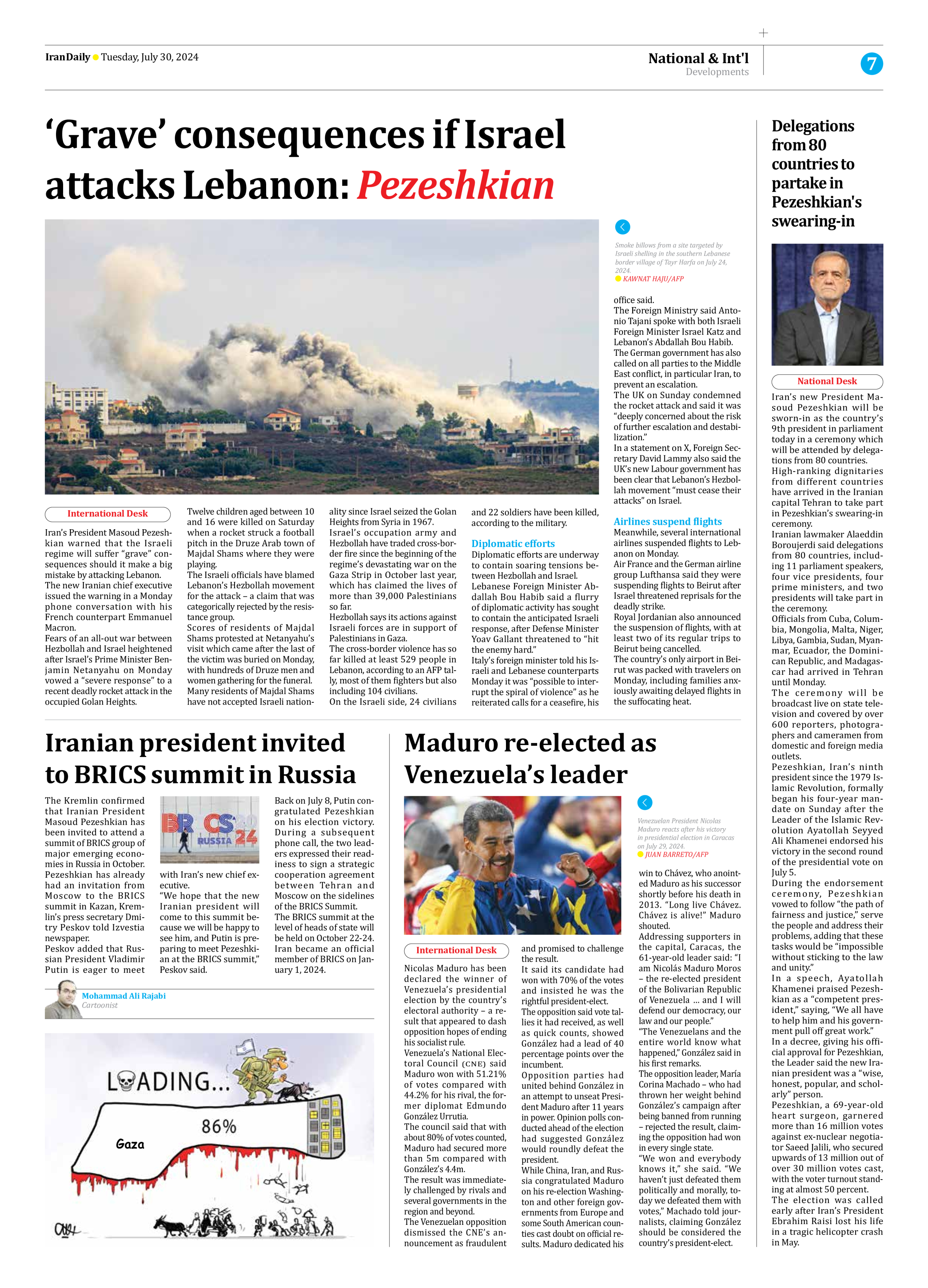
‘Grave’ consequences if Israel attacks Lebanon: Pezeshkian
Iran’s President Masoud Pezeshkian warned that the Israeli regime will suffer “grave” consequences should it make a big mistake by attacking Lebanon.
The new Iranian chief executive issued the warning in a Monday phone conversation with his French counterpart Emmanuel Macron.
Fears of an all-out war between Hezbollah and Israel heightened after Israel’s Prime Minister Benjamin Netanyahu on Monday vowed a “severe response” to a recent deadly rocket attack in the occupied Golan Heights.
Twelve children aged between 10 and 16 were killed on Saturday when a rocket struck a football pitch in the Druze Arab town of Majdal Shams where they were playing.
The Israeli officials have blamed Lebanon’s Hezbollah movement for the attack – a claim that was categorically rejected by the resistance group.
Scores of residents of Majdal Shams protested at Netanyahu’s visit which came after the last of the victim was buried on Monday, with hundreds of Druze men and women gathering for the funeral.
Many residents of Majdal Shams have not accepted Israeli nationality since Israel seized the Golan Heights from Syria in 1967.
Israel’s occupation army and Hezbollah have traded cross-border fire since the beginning of the regime’s devastating war on the Gaza Strip in October last year, which has claimed the lives of more than 39,000 Palestinians so far.
Hezbollah says its actions against Israeli forces are in support of Palestinians in Gaza.
The cross-border violence has so far killed at least 529 people in Lebanon, according to an AFP tally, most of them fighters but also including 104 civilians.
On the Israeli side, 24 civilians and 22 soldiers have been killed, according to the military.
Diplomatic efforts
Diplomatic efforts are underway to contain soaring tensions between Hezbollah and Israel.
Lebanese Foreign Minister Abdallah Bou Habib said a flurry of diplomatic activity has sought to contain the anticipated Israeli response, after Defense Minister Yoav Gallant threatened to “hit the enemy hard.”
Italy’s foreign minister told his Israeli and Lebanese counterparts Monday it was “possible to interrupt the spiral of violence” as he reiterated calls for a ceasefire, his office said.
The Foreign Ministry said Antonio Tajani spoke with both Israeli Foreign Minister Israel Katz and Lebanon’s Abdallah Bou Habib.
The German government has also called on all parties to the Middle East conflict, in particular Iran, to prevent an escalation.
The UK on Sunday condemned the rocket attack and said it was “deeply concerned about the risk of further escalation and destabilization.”
In a statement on X, Foreign Secretary David Lammy also said the UK’s new Labour government has been clear that Lebanon’s Hezbollah movement “must cease their attacks” on Israel.
Airlines suspend flights
Meanwhile, several international airlines suspended flights to Lebanon on Monday.
Air France and the German airline group Lufthansa said they were suspending flights to Beirut after Israel threatened reprisals for the deadly strike.
Royal Jordanian also announced the suspension of flights, with at least two of its regular trips to Beirut being cancelled.
The country’s only airport in Beirut was packed with travelers on Monday, including families anxiously awaiting delayed flights in the suffocating heat.







